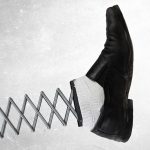Do you suffer from road rage? How about life rage? Well, this post will apply REBT to managing both.
Even though “rage” may not be the level of upset you experience, these tools work for all perturbance.
Let’s start by defining our terms.
ANGER VS. FRUSTRATION
Anger and frustration are similar but we usually experience anger in relation to others, whereas frustration is the feeling we experience when our path to a goal is blocked (the car won’t start), or we don’t get what we want (yesterday’s gas price), or do get what we don’t want (a flat tire).
Anger is the feeling we experience in reaction to the same disappointments above, but instead of being delivered by Life, it is a person(s) who we perceive as acting against us.
We may feel wronged or harmed and take it personally. Instead of the car not starting, it might be the neighbor blocking your driveway. Instead of the gas price increase, it might be the person ahead at the gas pump washing their car with the squeegee. Instead of a flat tire, it might be the guy driving in front of you who signals left and turns right.
ANGER VS. ANNOYANCE
We hear:
– some anger is good,
– a lot of anger is bad,
– but it’s good to safely blow it off (sublimation),
– but watch how you do it, and
– certainly don’t suppress anger for it causes depression and disease,
– but anger can push others away and get you into trouble.
Sheesh, let’s make up our minds!
REBT introduces some sanity into the use and misuse of the concept of anger by encouraging what we think of this emotion on a spectrum, starting with mild annoyance to moderate annoyance to severe annoyance. These levels or intensities of ANNOYANCE are all healthy negative emotion; but at some point, where this healthy negative emotion of annoyance becomes self-defeating, we call this unhealthy negative emotion ANGER.
ANNOYANCE IS HEALTHY
Defining annoyance as healthy negative emotion allows us to appreciate the importance of letting people know that we’re displeased, and respectfully asserting ourselves when we think we’ve been treated poorly. Thus, laws get changed and defective toasters get returned to Walmart.
Responsibly asserting ourselves by respectfully expressing annoyance—not anger—feels empowering and also acts like an antidepressant. Not that we need approval (remember USA from blog post 4/29/22), but assertiveness engenders respect.
ANGER IS UNHEALTHY
Defining anger as an unhealthy negative emotion reminds us that it is self-defeating and not in our best interest.
The negative consequences of anger and losing control can cost relationships, jobs, money, liberty, and well being. Anger-proneness has risen as a risk factor in contributing to stroke and cardiovascular disease on a par with smoking, obesity, sedentary lifestyle, and family history of heart disease.
The ancients likened anger to throwing a hot coal at your enemy—who gets burned the most?
GEARING UP FOR ANGER
1st speed: Demand that you must get your way, be treated well, not be disappointed or inconvenienced;
2nd speed: Consider it terrible and awful when others don’t act the way you think they should;
3rd speed: Declare that you just can’t stand it when others act poorly, stupidly and disappointingly;
4th speed: Blame, damn and down them as jerks, idiots and assholes for not acting as you command.
DOWNSHIFTING FOR ANNOYANCE
4th speed: Stop demanding good treatment, accept that everything is as it should be—not as you want;
3rd speed: Nothing is 100% bad if it can always be worse—so awful and terrible exist mostly in your mind;
2nd speed: Realize that you are living proof (check pulse) that you can stand what you merely don’t like;
1st speed: You can accept others, without blame, as fallible human beings (FHB), just like yourself.
TAKE AN REBT TEST DRIVE
1st gear: I’m about to start a 2 ton mass of metal and potential mayhem and enter the motorized matrix in which I will have little or no control at times.
2nd gear: I may have more than the 10,000 hours practice said to be needed for skill mastery, but how many other drivers have that?
3rd gear: And what toll on their judgment and ability will be taken by their driving drowsy, drunk, distracted and/or disturbed (like angry)?
4th gear: I fully expect to see bad driving but don’t have to get angry; relaxed muscles produce quicker reaction times needed for defensive driving—and survival!
5th gear: When I come upon bad driving I will remember that we’re all Fallible Human Beings (FHB), my anger hurts only me, and that I can downshift to healthy annoyance.
TAKEAWAY:
Anger is self-abuse.





